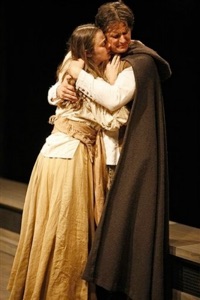Reviews 2008






✭✭✭✭✩
written and directed by John Krisak
Arbitrary Angle, The Arts Project, London
April 29-May 3, 2008
"A Glimpse of the Master"
For this reviewer seeing John Krisak’s play “Robertson Davies: The Peeled I” was a very unusual experience. It is the first time I can recall ever seeing someone I’ve known personally appear as a character in a play set in a place, Massey College, where I used to live. From 1977-80 I was a Junior Fellow at Massey College when Davies, the Founding Master (1963-81) was still Master. One of the back-screen projections used as part of the set is a view diagonally across the Massey quadrangle, a view of the Master’s office not from it, but nevertheless of a place that was once daily familiar.
What is best about the play is that through well-chosen anecdotes and readings from Davies’ works, Krisak captures so much of what made Davies such a remarkable person, one that we Masseyites all felt privileged to have known. The two-hour play begins as a lecture where Davies chooses a topic well known to himself, i.e. himself. He confesses that being no good at any of the things his parents wanted him to be, he decided to become a writer. When someone gives him the advice that to be a good writer you have to keep your eye peeled, he gives us a fantastic account of visiting a witch who both peels and heals his eyes. After that operation he notices that he has the ability to see things others people simply do not notice. Although it is never made explicit in the play, the subtitle “The Peeled I” suggests that what blinds people to their surroundings is the ego.
The show is arranged more thematically than chronologically so that Davies reads significant sections of his works in the following order: “Fifth Business” (1970), “Tempest-Tost” (1951), “The Diary of Samuel Marchbanks” (1947) and “World of Wonders” (1975). Krisak has Davies relate his life story with the most amusing anecdotes including his study at Oxford, meeting his wife Brenda Matthews while both were at the Bristol Old Vic, attempting to write plays in Canada when the country was really not ready to enjoy drama, editing the Peterborough Examiner and becoming Master of Massey College, where he wrote and read his famous ghost stories for Gaudy Night every year.
If there is a flaw with the play it is that the lecture format is dropped after intermission and we inexplicably move forward in time to 1981 when Davies, having retired from the University, has to clear out his Master’s office at Massey. (In fact, as Master Emeritus, he still maintained an office at Massey for many more years.) He now seems to be reminiscing as he packs away his things, with various books prompting his thoughts, rather than deliberately presenting himself to us. Krisak should choose one format or the other. Davies handing over the mastership to Patterson Hume did not mean his departure from Massey quite as Krisak suggests. While it provides a convenient cut-off point, it also means we don’t get to hear about any of the works he published from 1981 on like the Cornish Trilogy (1981-88) satirizing university life or the realization of a life-long dream, his libretto for the opera “The Golden Ass” (1999).
K. Reed Needles is excellent as Davies. He sports a beard and moustache but long hair rather than short so he looks rather more like “Buffalo Bill” Cody than Davies. Still, he suggests Davies’ deliberately affected 19th-century appearance rather than replicates it. The voice, however, he has down perfectly, the cadences, the use of significant pauses, even the occasional logjam of words at the start of a sentence as if hosts of thoughts were vying to escape simultaneously.
The uncredited set is more elaborate than I had expected and conjures up the clean line but Victorian mood of Massey College. The projections on the window when not of the quadrangle are portraits of each of the notable people from Ibsen and Jung to a man who dissolved his wife in lye who one way or another had an influence on his thinking. At the end a rapid montage credited to Dan Chick of all the figures flash by in rapid succession until they are replaced with a portrait of Davies himself. This imaginative move sums up with great simplicity an idea in both Jung and Davies of the collective unconscious, “a reservoir of the experiences of our species”, that moves the psyche to self-actualization, to becoming an individual---something it can do better than the ego or “I”. But as a writer Davies sees with a “peeled I”.
By the end one couldn’t help but regret that we have no one like Davies around any more, no one to praise the virtues of arcane wisdom like ancient Egyptian “Seven Laughters of God” to undermine our ongoing obsession with everything that’s new while dreadfully unaware of what has gone before. Davies reminds us that untethering ourselves from the past is to set ourselves adrift. We miss someone like Davies, who helped us see the depths beneath the obtrusive superficies of daily life. Krisak’s play and Needles’ performance are welcome reminders of the master we had in Davies.
©Christopher Hoile
Note: This review is a Stage Door exclusive.
Photo: K. Reed Needles. ©Daniel DiMarco.
2008-05-12



Robertson Davies: The Peeled I






